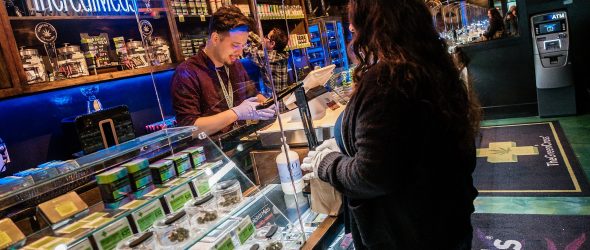The cannabis industry has soared during the initial wave of the coronavirus pandemic, but the next stage may be more difficult to navigate as the companies are not eligible for federal assistance.
Since plants containing more than 0.3% THC are classified as Schedule 1 drugs, cannabis businesses have been left out of the $2 trillion stimulus package, are barred from Small Business Administration-funded loans and anticipate problems with some employee benefits.
“We find it extremely disturbing that, even in a time of national crisis, the cannabis industry is still not recognized for the value we bring to our communities by federal authorities,” said Kevin Reed, the president of the Green Cross in San Francisco’s Excelsior neighborhood. “The state of California has deemed cannabis business as essential, but the federal government will not support our efforts by providing much-needed assistance to our staff and their families. Rest assured that the Green Cross will do everything we can to make up for our staff’s inability to access these crucial benefits. They are putting their lives on the line to provide essential services to patients throughout the country, and they should be recognized for their efforts during this time.
“We are all taxpaying citizens who should be treated with the same dignity and respect as other essential workers.”
Reed praised San Francisco Mayor London Breed and California Gov. Gavin Newsom for deeming the cannabis industry “essential” during the state’s stay-at-home order, and the market appears to agree.
According to Jane Technologies, a cannabis e-commerce service for local dispensaries like Airfield, Apothecarium and Harborside, cannabis sales are skyrocketing.
The average Bay Area store has increased revenue by 52% from January, and new-user ordering has jumped online 142% since February. In the past week, pickup-only sales have increased 52%, and delivery sales have risen 46%.
Harborside, with four stores and $60 million in annual revenues, has seen sales leap by about 25% during the month. Still, there’s always an eye on what’s next.
“Because of the remaining federal issues with decriminalization, we did not expect to be considered for (federal) assistance. The fact, that at this time, we remain open for business as an essential service, means we at Harborside are not in need,” CEO Peter Bilodeau said in a statement. “Nonetheless, we look forward to, and will continue to tirelessly work toward, the day where legal businesses in the cannabis industry are treated fairly and equally to all other industries.”
Cannabis industry trade groups penned a joint letter to Congress urging lawmakers to give their state-legal businesses the same protections as others.
Dale Gieringer is the director of California NORML (National Organization for the Reform of Marijuana Laws). He said he believes that state-level unemployment insurance will continue to provide benefits to laid-off cannabis workers and federal funds could be transferred for states’ considerations.
But much of it is still unclear.
“This is just one of many examples of how the cannabis industry is discriminated against under federal law: lack of legal banking, no business expense deductions, ineligibility for SBA loans, etc.,” Gieringer said. “All because cannabis remains a federally illegal Schedule 1 substance.
“No relief can be expected until cannabis is reclassified as a legal substance.”
Rusty Simmons is a San Francisco Chronicle staff writer. Email: rsimmons@sfchronicle.com Twitter: @Rusty_SFChron


